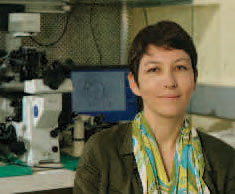Less Anxierty Improves In Vitro Fertilization

Dr. Nathalie Rappaport
For many women who have difficulty getting pregnant, the in vitro fertilization (IVF) process can be extremely stressful and all consuming. A preliminary research study conducted by Dr. Nathalie Rappaport, clinical psychologist at Rabin Medical Center's IVF Unit, together with Dr. Yuri Gedron of the UK; Dr. Rivka Reicher-Atir, head of the Psychology Service at RMC; Dr. Onit Sapir, head of the IVF laboratories; and Prof. Benny Fisch, Director of the RMC IVF Unit, suggests that when it come to success with IVF, less anxiety is helpful to the outcome.
The study examined the relationship between coping techniques and the outcome of IVF treatment. A group of 132 women who participated in the study were evaluated at the beginning of an IVF cycle with regard to anxiety, depression, optimism and overall mental health. The study revealed that those women who were more relaxed during the IVF process, were more successful in getting pregnant.
According to Dr. Nathalie Rappaport, women undergoing IVF who were less
stressed by the experience and who go into treatment with fewer expectations and anxieties are more likely to get pregnant. Techniques such as meditation and relaxation therapy are some of the ways women can cope with the treatment process and handle it with greater ease and comfort.
The IVF Unit at Rabin Medical Center's Women's Hospital was founded in 1985, and thousands of babies have been born since to parents who have sought Rabin Medical Center's help. Today Rabin Medical Center is the largest and busiest public IVF center in Israel, performing approximately 1600 IVF treatment cycles every year. From the first consultation through the treatment process and afterwards, an experienced, highly skilled and committed team of specialists in infertility and reproductive medicine incorporates state-of-the-art techniques that have revolutionized
fertility treatments.
The services at Rabin Medical Center extend far beyond fertility treatment into key related areas, including the reproductive endocrinology and infertility clinic, andrology clinic, a sperm bank, recurrent pregnancy loss clinic, and fertility preservation clinic. A significant part of ongoing research focuses on the field of fertility preservation for women. Rabin Medical Center's clinical and research laboratory, led by a world-renowned expert in this field, offers ovarian tissue cryopreservation to girls and women undergoing therapy which creates a risk of irreversible damage to fertility. In collaboration with the genetic team, there is also a program for assessing the chromosomal status of in vitro formed embryos.
It would be difficult to describe in words the moments of pure joy that the IVF team has brought to those who yearned for a child and saw their dream come true.
